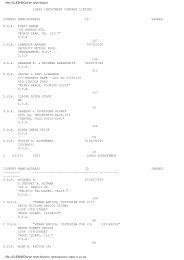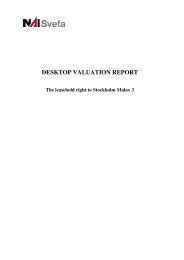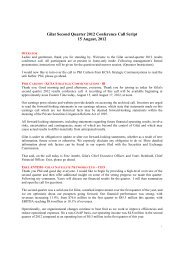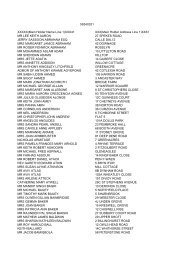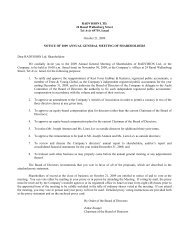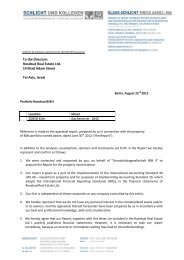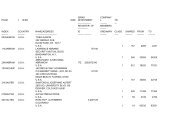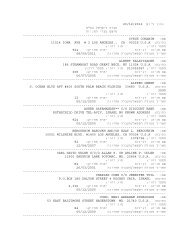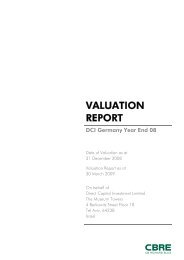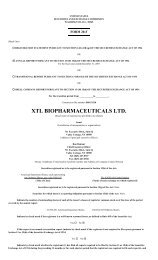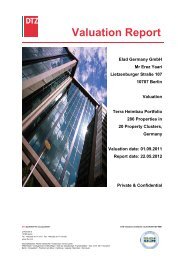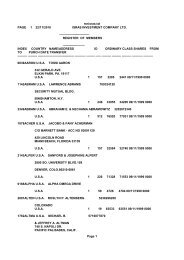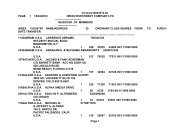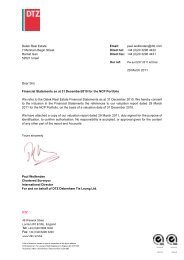RETALIX LTD.
RETALIX LTD.
RETALIX LTD.
Create successful ePaper yourself
Turn your PDF publications into a flip-book with our unique Google optimized e-Paper software.
Passive Foreign Investment Companies<br />
We would be a passive foreign investment company, or PFIC, if:<br />
• 75% or more of our gross income, including the pro rata share of our gross income for any company, U.S. or foreign, in which we are considered to<br />
own 25% or more of the shares by value, in a taxable year is passive income; or<br />
• at least 50% of the assets, averaged over the year and generally determined based upon value, including the pro rata share of the assets of any<br />
company of which we are considered to own 25% or more of the shares by value, in a taxable year are held for the production of, or produce,<br />
passive income.<br />
Under certain “look-through” rules, the assets and income of certain subsidiaries are taken into account in determining whether a foreign corporation<br />
meets the income test and/or asset test.<br />
Passive income generally consists of dividends, interest, rents, royalties, annuities and income from certain commodities transactions and from<br />
notional principal contracts. Cash is treated as generating passive income.<br />
If we become a PFIC, each U.S. holder who has not elected to treat us as a qualified electing fund, “QEF election”, or who has not elected to mark<br />
the shares to market as discussed below, would, upon receipt of certain distributions by us and upon disposition of the ordinary shares at a gain, be liable to<br />
pay tax at the then prevailing highest tax rates on ordinary income plus interest on the tax, as if the distribution or gain had been recognized ratably over<br />
the taxpayer’s holding period for the ordinary shares. In addition, when shares of a PFIC are acquired by reason of death from a decedent that is a U.S.<br />
holder, the tax basis of the shares does not receive a step-up to fair market value as of the date of the decedent’s death, but instead would be equal to the<br />
decedent’s basis if lower, unless all gain is recognized by the decedent. Indirect investments in a PFIC may also be subject to special tax rules.<br />
The PFIC rules above would not apply to a U.S. holder who makes a QEF election for all taxable years that such shareholder has held the ordinary<br />
shares while we are a PFIC, provided that we comply with certain reporting requirements. Instead, each U.S. holder who has made such a QEF election is<br />
required for each taxable year that we are a PFIC to include in income a pro rata share of our ordinary earnings as ordinary income and a pro rata share of<br />
our net capital gain as long-term capital gain, regardless of whether we make any distributions of such earnings or gain. In general, a QEF election is<br />
effective only if we make available certain required information. The QEF election is made on a shareholder-by-shareholder basis and generally may be<br />
revoked only with the consent of the IRS. Although we have no obligation to do so, we intend to notify U.S. holders if we believe we will be treated as a<br />
PFIC for any tax year in order to enable U.S. holders to consider whether to make a QEF election. In addition, we intend to comply with the applicable<br />
information reporting requirements for U.S. holders to make a QEF election. U.S. holders should consult with their own tax advisers regarding eligibility,<br />
manner and advisability of making the QEF election if we are treated as a PFIC.<br />
A U.S. holder of PFIC shares which are publicly traded could elect to mark the shares to market annually, recognizing as ordinary income or loss<br />
each year an amount equal to the difference as of the close of the taxable year between the fair market value of the PFIC shares and the U.S. holder’s<br />
adjusted tax basis in the PFIC shares. Losses would be allowed only to the extent of net mark-to-market gain previously included by the U.S. holder under<br />
the election for prior taxable years. If the mark-to-market election were made, then the rules set forth above would not apply for periods covered by the<br />
election.<br />
We believe that we were not a PFIC for 2005 and do not anticipate being a PFIC in 2006. The tests for determining PFIC status, however, are<br />
applied annually, and it is difficult to make accurate predictions of future income and assets which are relevant to this determination. Accordingly, there<br />
can be no assurance that we will not become a PFIC. U.S. holders who hold ordinary shares during a period when we are a PFIC will be subject to the<br />
foregoing rules, even if we cease to be a PFIC, subject to certain exceptions for U.S. holders who made a QEF or mark-to-market election. U.S. holders are<br />
strongly urged to consult their tax advisors about the PFIC rules, including the eligibility, manner and consequences to them of making a QEF or mark-tomarket<br />
election with respect to our ordinary shares in the event that we qualify as a PFIC.<br />
80



